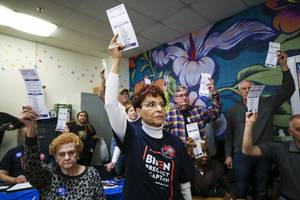One might expect that a candidate nominating process designed by Republican leadership, filled with fake electors from 2020, would be unusual. But the Nevada GOP’s precedent-breaking caucus for determining the 2024 presidential nomination has proven to be perhaps the most confounding process in the nation.
Republican voters will be able to cast ballots in both the state-run Presidential Preference Primary (PPP) on February 6 and the private so-called “First in the West” caucus being held two days later by the Nevada GOP.
As of press time, former United Nations Ambassador Nikki Haley is the only major candidate participating in the primary. (Former Vice President Mike Pence and South Carolina U.S. Sen. Tim Scott had previously pledged to the primary, but have since suspended their campaigns.) Former President Donald Trump will appear on the caucus ballot alongside political newcomer Ryan Binkley. Florida Gov. Ron DeSantis and businessman Vivek Ramaswamy have dropped out and were removed from the caucus ballot according to the Nevada GOP’s website as of Monday. While making the ballot changes, the GOP did not add Haley as an option for caucus-goers even though she’s the last major candidate competing with Trump.
Polling had already shown Trump holding what appeared to be an insurmountable lead for the nomination. And with DeSantis now out of the way, that leaves the Republican electorate to either coalesce around Haley (assuming she stays in the race after New Hampshire’s primary), or to head for a rematch of the 2020 race between Trump and President Joe Biden.
After a series of changes instituted by the Nevada GOP, the Silver State’s 26 delegates that will help determine who wins the Republican nomination seem to be hurdling headfirst to Trump.
According to rules passed by the state party’s central committee in September, candidates are allowed to only participate in either the caucus or the primary. Delegates will not be given to any candidate who participates in the state-run primary, nor will any write-in candidates be considered for the caucus. This left Haley with zero chance of winning delegates—party representatives who, in essence, vote for the party’s presidential nominee at the Republican National Convention, which runs July 15-18 in Milwaukee.
That also means Trump won’t appear on the ballots for the state-mandated primary and Haley supporters won’t be allowed to caucus for their candidate, causing a cascade of confusion and irritation. Inevitably, this means the public vote and the caucus results will end in a split decision with respect to who the GOP electorate actually wants to be their presidential candidate.
Election 2024
- Caucus chaos: Unraveling the confusion surrounding Nevada’s presidential nominating process
- A closer look at voter ID issues in the Nevada GOP caucus
- Primary Picks: Nikki Haley is the GOP’s best hope for a return to sanity
- Primary Picks: President Joe Biden is a proven champion for all Americans
- Anti-democratic strategies abound in Nevada GOP caucus
- You may be frustrated by the system, but that doesn’t mean it’s stopped working—unless you give up
- Early voting sites and mail ballot drop-off sites
The February 8 caucuses are substantially different from the 2016 convention in that it is entirely administered and overseen by the Nevada GOP, making it, in essence, a private event with its own rules and virtually no public oversight. A bill passed in 2021 transitioned Nevada to closed primaries for Nevada’s Republican and Democratic parties, but McDonald’s GOP has insisted on holding its own caucuses as its nominating convention on unfounded assertions it will be more secure and that results will be available more quickly.
Despite a legal challenge brought by Republicans last year (and dropped earlier this month), the Carson City District Court judge ruled that the state can hold its primary while the party maintains its right to allocate delegates using the convention it prefers. Hence, two Republican elections will be held two days apart. One will likely have a higher turnout but zero consequence; and voters will be left to discern the difference.
Even in spite of Trump’s perceived popularity, some Republicans here and nationally believe the Nevada caucus rules give the former president an outsize advantage beyond the traditional benefits that come with being a de facto incumbent.
“I think the Nevada GOP has made a huge mistake—they’re the ones who sit there and cry election fraud and want honesty and integrity when this is anything but,” says Amy Tarkanian, a predecessor of current state party chairman Michael McDonald, who was removed from the Nevada Republican Central Committee in late 2022 after endorsing Democrats over pro-Trump Republicans in two statewide races. “I think they intentionally did this so [that] they could have a smaller amount of participation [in the caucuses] so they can control the outcome.”
In March, McDonald—who was among the six Nevadans indicted in December on forgery charges for his involvement in a phony elector ceremony after the 2020 election that falsely asserted Trump won Nevada’s six electoral votes—was part of a Nevada GOP contingent that met with the former president at his Mar-a-Lago estate, according to the New York Times. Since that meeting, the state party passed a series of internal rules that will make it easier for Trump to win.
Neither McDonald nor the Nevada GOP responded to interview requests. But other Nevada Republicans tell the Weekly they agree with Tarkanian’s assessment that the leaders of the Nevada GOP favor Trump’s brand of conservatism and will go out of their way to crush dissent.
“When it gets down to it, it seems rather apparent that the state GOP is trying to maximize the opportunities for the former president,” a high-ranking Nevada Republican told the Weekly on the condition of anonymity in order to speak freely about the party’s inner workings. “And that’s why this caucus system has been pushed so hard.”
They continued: “We should be locking arms and doing everything in our power to defeat Joe Biden instead of having some purity test for who really is or is not a Republican. There are self-appointed gatekeepers who somehow believe they are entitled subjectively to determine the purity of somebody’s Republicanism. It’s absolutely asinine.”
Furthermore, the Nevada GOP charged a $50,000 fee to candidates participating in the caucus. Tarkanian likened such a fee to extortion, and Las Vegas-based trial lawyer Ronda Kennedy, who is running in the Republican primary to challenge Nevada Democratic U.S. Sen. Jacky Rosen in November, told the Weekly she believes the caucuses are a result of conservative skepticism surrounding the 2020 election—caused by months of disproven claims of rampant voter fraud by Trump and his allies.
“I think the GOP has their thumb on the scale to make money,” says Kennedy, who returned to Las Vegas in 2022 after living in California for 12 years. “I really just think it was a money grab for the Nevada GOP.”
Others believe that constantly relitigating the 2020 election will prove to be a losing issue.
“The fundamental evidence and arguments on which some in the GOP argue for a caucus has been declared legally wrong,” says former Lt. Gov. Mark Hutchison, who chaired the gubernatorial campaign for current Republican Gov. Joe Lombardo. “I think we’ve got to get past that, and the GOP should focus on winning elections with strong candidates and using a primary system to provide the most GOP voters the greatest opportunities to vote for all the candidates.”
A recent Emerson College poll conducted before DeSantis dropped out found Trump getting 73% support in a Haley-less caucus, with the Florida governor getting 8%. But Spencer Kimball, executive director of polling for the university, notes the survey found more Republican voters will likely be taking part in the February 6 state-run primary. The Haley campaign did not return multiple requests for comment.
That creates the likelihood Haley will be the top vote getter, giving her a two-day window to craft a narrative that she is the true winner of Nevada, says David Damore, chairman of political science at UNLV.
“It will depend on the degree it gets media attention,” says Damore, also the executive director at the Lincy Institute and Brookings Mountain West, adding that success in Iowa and New Hampshire are key. “That’s going to be their spin. Whether the people buy it, that’s a whole other issue. But I do think it creates that opportunity for her campaign.”
Damore also noted two things can be true at once: Trump can be the preferred choice of the Republican electorate, and the Republican establishment can also work to make it easier for Trump to be the nominee, similar to Hillary Clinton’s route to secure the 2016 Democratic nomination.
But Trump should be given credit for organizing an outreach campaign superior to that of DeSantis, Haley or any other GOP challenger, Kash Patel, a former senior member of the Trump Administration who remains an advisor to the former president, told the Weekly.
“President Trump, from a Republican primary standpoint, doesn’t overlook any state,” Patel says. “He’s on the ground multiple times in every single state.”
And it’s true that Trump has been to Nevada the most of any other GOP candidate this cycle. Neither DeSantis nor Haley have been here since the Republican Jewish Coalition’s national convention in Las Vegas in late October. But unlike them, Trump, who was also there, held a rally in Reno last month—just days after McDonald and others were charged for their involvement in the fake elector scheme.
“What other Republican is coming to Nevada or even speaking to Nevadans has a better policy to secure law enforcement and national security priorities that impact everyday Nevadans than Donald Trump? I haven’t heard of one,” says Patel, who moved to Las Vegas after Trump’s presidency and called McDonald a friend.
While Patel conceded the caucus is an imperfect system, he disagrees the Nevada GOP and McDonald have put the fix in for Trump.
“Look, it’s not a simple process but it’s the process that we have here in our state to run this primary,” Patel says. “I don’t think there’s any truth that it somehow benefits Donald Trump just because he’s Donald Trump. I think it works for the benefit of Donald Trump because he’s doing the most work to put the most Nevadans into this caucus that this state has ever seen, and he’s just the guy leading that effort.
“To me, that’s pretty fair,” Patel continued.
National media reports suggest the Trump campaign is gunning to secure the nomination by as early as late March, which might be important to him given the former president’s mounting legal troubles that could keep him in the courtroom rather than on the campaign trail. Trump is facing 91 felony charges, which stem from four separate criminal cases as well as a defamation lawsuit and a civil suit that could ultimately bar him from conducting business in New York.
Click HERE to subscribe for free to the Weekly Fix, the digital edition of Las Vegas Weekly! Stay up to date with the latest on Las Vegas concerts, shows, restaurants, bars and more, sent directly to your inbox!





